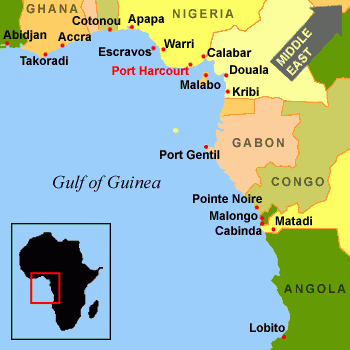Barack Obama's visit to Ghana is, most fundamentally, about West African oil and natural gas, and control of the corridors for transporting it through the Gulf of Guinea, on the West African Coast. Nigeria, the greatest source of African oil for export, is at the center of the African oil producing states bordering the Gulf, and the Niger River is the corridor for transporting Nigerian oil and gas, and now, oil and gas from landlocked Niger, as well.
Today, on 07/10/2007, at 10:18 A.M., PST, a Web search for "Obama in Ghana," yielded 8,820,000 hits.
A Web search, one minute later, for "Obama in Ghana Oil," yielded 1,100,000.
These numbers will no doubt continue to fluctuate today, and in coming days, but I expect the proportion of fluff reporting to honest reporting to remain roughly the same.Â
Notable on the side of honesty are:
Obama's Ghana Trip Linked to New U.S. Oil Strategy, produced by Canada Newswire and posted to Fox Business News via Comtex.
Media Briefing Booklet on the Occasion of Obama's Visit to Ghana, 07.10.2009, produced by the Africa Faith and Social Justice Network, Friends of the Congo, Africa Action, the Integrated Social Development Centre, transAfrica, and, Foreign Policy in Focus, a project of the Institute for Policy Studies (IPS), which encourged press press to pose this question to President Obama:
"Ninety percent of U.S. Africa trade is in oil, gas, and mining industries. Much of the trade in these extractive industries has been exploit ative, bringing little value to those on whose land the resources lie.  Ghana has discovered oil just in 2008. How will the Obama administration advance trade policy with Ghana and other African countries that are mutually beneficial?"
The other most important research documents for understanding Obama in Ghana, which is to say, Obama in Ghana, and Oil, are:
African Oil: a Priority for U.S. National Security and African Development, a "National Energy Policy Report" produced by the Office of Richard Cheney, and publised on May 16, 2001. For whatever reason, its URL is: http://www.israeleconomy.org/strategic/africawhitepaper/pdf.Â
AFRI(OIL)COM, by Foreign Policy in Focus at the Institute for Policy Studies, and, Resist Africom, the video, also produced by the Institute for Policy Studies.
This essay first appeared on Examiner.com.





